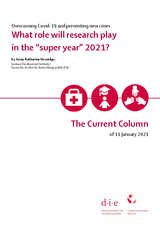The Current Column
Overcoming Covid-19 and preventing new crises
What role will research play in the “super year” 2021?
Hornidge, Anna-KatharinaThe Current Column (2021)
German Development Institute / Deutsches Institut für Entwicklungspolitik (DIE), The Current Column of 11 January 2021
2020 was dominated by a collective global crisis on an unprecedented scale, the impact of which was felt differently around the globe and in parts of society. And the Covid-19 pandemic will continue to cast its shadow this year. Yet the task facing 2021 is nothing short of monumental: to become a historic turning point. This is because the fight against Covid-19 and the recovery in the economy and society are coming at the same time as several major events in international environmental and climate policy. The media have christened 2021 a “super year”.
Against the backdrop of the fight against Covid-19 and the major events in international environmental and climate policy in 2021, what does this mean for research and policy advice in the field of sustainable development as carried out by the German Development Institute / Deutsches Institut für Entwicklungspolitik (DIE)?
The challenges facing the vaccination campaigns that have now got under way go well beyond the questions of financing, manufacture and approval, to be answered at multilateral level. Regional, national, local and sector-specific governance systems need to dovetail in a way seldom seen before in order to secure access to vaccines and get them distributed. Efforts to increase vaccine acceptance in society are also seeing extremely varied degrees of success around the world.
The global health crisis is being exacerbated by the cascading risks of the pandemic, which is fuelling an economic, social and political crisis as well. There are marked global differences between the recovery programmes that have been launched in terms of their financing volumes and the environmental and social standards attached to them. According to the International Monetary Fund, these range from 9.3 per cent of GDP in high-income countries to 6 per cent in emerging economies and 1.8 per cent in low-income countries. The World Bank is expecting the pandemic to trigger cycles of widening income disparity at global level. If we are to ensure that we “build forward better” – to borrow the words of UN Secretary-General António Guterres – in a socially and environmentally sustainable manner, these stimulus packages must therefore both, combat the social inequalities caused by the pandemic and forestall the climate crisis.
Four sets of international environmental and climate policy negotiations in 2021 are worthy of particular mention: (1) The 15th Conference of the Parties to the UN Convention on Biological Diversity, currently scheduled for May in Kunming, China. (2) The 26th Conference of the Parties to the UN Framework Convention on Climate Change in November in Glasgow, Scotland (hosts: UK and Italy), to agree a common decarbonisation strategy for the years to 2050. (3) The 19th session of the Committee for the Review of the Implementation of the UN Convention to Combat Desertification in March, online. (4) Formulating the UN Decade of Ocean Science for Sustainable Development 2021–2030 (including the World Ocean Summit, March, Lisbon, Portugal).
Ambitious leadership, particularly from Europe, the US and China, is expected in these talks. These efforts are to be supported by the trio of EU Council presidencies held by Germany (2020), Portugal and Slovenia (both 2021) as well as Italy’s presidency of the G20 and the UK’s of the G7 (followed by Germany in 2022). China signalled its position in late 2020 with its voluntary commitment to be carbon-neutral by 2060. In the US, meanwhile, the accession of a new president gives grounds for hope.
It is against this geopolitical background shaped by the pandemic that the DIE is conducting its social, economic and political research into sustainability and cooperative development. Its aim is to contribute to strategies for overcoming the Covid-19 crisis via empirically based research reflected in international partnerships and to provide scientifically-based policy advise for measures designed to prevent future crises. This is research that addresses the challenges facing society, engages with political negotiations as well as with public discourse. And serves as confidential advisor in the interests of transformative research.
With this in mind, the DIE expressly welcomes the UN Research Roadmap for the COVID-19 Recovery and supports its implementation, with a focus on the conjunction of climate and environmental policy issues and global inequalities. This covers questions about the impact of the pandemic on societies and economies in Africa, Asia and Latin America and on regional (EU, AU) and multilateral cooperation (UN system, G20) as well as devising tangible approaches to handling and preventing crises. Examples include work on the Covid-19 financial instruments as a transformative, preventative lever for the climate crisis as well as conducting empirical studies of social cohesion in various local contexts and analysing it in terms of crisis resilience and prevention.
With the fight against Covid-19 coinciding with the UN’s environmental and climate policy talks, 2021 is set to be a unique year for research for sustainable development as well. This community is called on to use its collective expertise to consider the accelerated processes of crisis management and its experience to support the rapid changes, as well as to provide policymakers and society with background knowledge to guide them. Global partnerships that have developed over the years to deliver rounds of reflection and consultation have a crucial role to play here, as do confidential consulting structures between the worlds of research and politics. “Alternative facts” in the crisis debate must be curbed in a shared critical and objective dialogue, and the fight against Covid-19 and the subsequent recovery must be harnessed collectively to take decisive action to combat the climate crisis and the widening of global inequalities.
Anna-Katharina Hornidge is Director of the German Development Institute / Deutsches Institut für Entwicklungspolitik (DIE) and holds a professorship for Global Sustainable Development at the University of Bonn. She is a development and knowledge sociologist by training. Before moving to DIE and the University of Bonn, she headed the social science department at the Leibniz Center for Tropical Marine Research and held a professorship at the University of Bremen.


